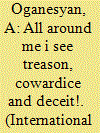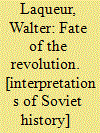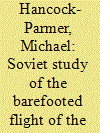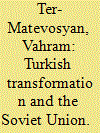|
|
|
Sort Order |
|
|
|
Items / Page
|
|
|
|
|
|
|
| Srl | Item |
| 1 |
ID:
100347


|
|
|
|
|
| Publication |
2010.
|
| Summary/Abstract |
THERE ARE TIMES when the human soul is filled from within with such an overbearing and unassailable feeling of evil and gloom that it requires inhuman power, some extraordinary exploit to overcome it ... This is when the person prone to suicide shouts faint-heartedly: "I don't want to live, and I'm not going to live," while the long sufferer beseeches: "I can't live, but I yearn for Life." This is akin to the Agony in the Garden, when Jesus prayed in such earnest that it was as if great drops of blood were falling to the ground, when he prayed for this cup to pass him by . . . so that the light would not be engulfed by darkness. And not somewhere remote, in far-off galaxies, but right here in the heart, and only then in the galaxies, which, compared with the human heart, are nothing but dust and ashes... "All around me I see treason, cowardice and deceit" are not only the words Emperor Nicholas II used to reproach his contemporaries for forsaking him, they express the agony he felt for them, "for they know not what they do." Had he not felt this agony, the Sovereign's daughter would not have written, "He forgave everyone . . .," which was the message of reconciliation he asked her to give everyone who had remained faithful to him. He also forgave us, only do we really "not know what [we] do ... "? After the toxic gas of the revolutionary propaganda evaporated, after the whole of Soviet historiography had insulted and spit in the face of the royal family, after the archives were opened for public perusal, after the letters, diaries, memoirs, and eye-witness accounts were published, and after we became free to take sober account of the tragedy of the royal family's murder, we suddenly hear from the television screens and from the incompetent historian: "The empress was a idiot." While another philosophizing TV anchorman, primping and preening,
|
|
|
|
|
|
|
|
|
|
|
|
|
|
|
|
| 2 |
ID:
115821


|
|
|
|
|
| Publication |
2012.
|
| Summary/Abstract |
This article examines the changing relationship between ethno-national and local narratives in the historiography of Kazakhstan's Uyghurs through the parallel analysis of general and local histories compiled in the Soviet and post-Soviet periods. Uyghur history writing in the post-Soviet period is discussed in relation to the divided loyalty of the Uyghur community: while interest in writing ethno-nationalist histories is based on the growing feeling of being a part of the broad, transnational category of the Uyghur, deep attachment to the Semirech'e region is expressed in the emerging histories of Uyghur villages and neighbourhoods. In analysing the local histories of Kazakhstani Uyghurs in the post-Soviet period, the author focuses on the gradual transition from Soviet-style local histories praising the uniqueness of the 'Soviet' Uyghurs to new local histories emerging 'from below' as exemplified by the history of the Sultanqorghan neighbourhood of Almaty.
|
|
|
|
|
|
|
|
|
|
|
|
|
|
|
|
| 3 |
ID:
032612


|
|
|
|
|
| Publication |
London, WeidenFeld and Nicolson, 1967.
|
| Description |
viii, 216p.Hbk
|
|
|
|
|
|
|
|
|
|
|
|
Copies: C:1/I:0,R:0,Q:0
Circulation
| Accession# | Call# | Current Location | Status | Policy | Location |
| 001134 | 947.089/LAQ 001134 | Main | On Shelf | General | |
|
|
|
|
| 4 |
ID:
140446


|
|
|
|
|
| Summary/Abstract |
The defeat, devastation and exile of the Kazakhs in the early eighteenth century, commonly known as the Barefooted Flight, was the nation's most distressing pre-Soviet calamity. Kazakh nation-building and official remembrance projects – commemorated in state ceremonies, public education and popular culture – portray an uninterrupted, centuries-old practice of tribute to local heroes who challenged the foreign aggressors. Twentieth-century Kazakh and Russian intellectuals in the Soviet and post-Soviet eras studied and enshrined these events based on published, secondary sources, rarely giving attention to the thin trail of documents preserved in state archives. The historiography of the Barefooted Flight exposed a trend in how politically convenient historical lessons shaped the interpretation of events. By the end of the Soviet Union, some archival material was introduced, it was but misquoted so as not to challenge the current interpretation.
|
|
|
|
|
|
|
|
|
|
|
|
|
|
|
|
| 5 |
ID:
151856


|
|
|
|
|
| Summary/Abstract |
Being founded in the wake of the First World War, both Turkey and the Soviet Union followed revolutionary modernizing pathways. At the outset, one could trace many similar patterns in their radical modernization paradigms; however, their development models as well as political and social orders were radically distinct, which became more obvious with the passage of time. The paper discusses the external interpretations of Kemalism by observing the Soviet perspectives on the inception and evolution of Kemalism. Paying more attention to diplomatic, geopolitical and economic complexities of the Turkish-Soviet relations, scholars have rarely problematized the Soviet Union perceptions of Turkish ideological transformations. In reality, since the early 1920s, different state institutions, intellectual schools of thought and research in the Soviet Union closely observed the domestic transformations in Turkey by providing valuable insights on the perspective and the implications of the Kemalist transformation. The article also looks at the question of how the incorporation of Soviet perspectives can enrich the historiography and our understanding of Kemalism.
|
|
|
|
|
|
|
|
|
|
|
|
|
|
|
|
|
|
|
|
|